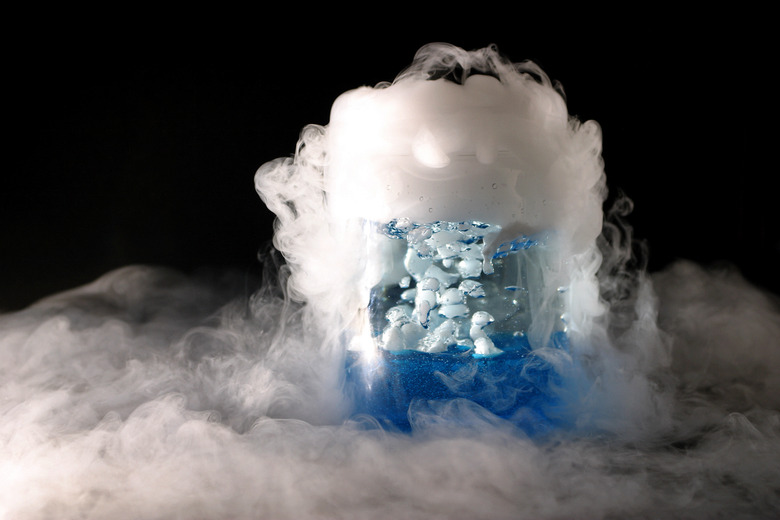How To Calculate Densities At Various Temperatures
To discover how temperature affects the density of a fluid substance, use one of two methods depending on the fluid you wish to measure. For gases, use an adaptation of the Ideal Gas Law, which, when rewritten, provides an equation for density based on temperature and pressure. For other fluids, such as water or alcohol, you must use more information to find their densities at various temperatures. When you have all of the information required for the calculation, solving it just takes a little math.
Find the Density of Liquids
1. Subtract Final Temperature
Subtract the final temperature in degrees Celsius from the initial temperature in degrees Celsius. For instance, a final temperature of 20 degrees C and an initial temperature of 30 degrees Celsius yields a difference of:
\(30^o\text{ C}-20^o\text{ C}=10^o\text{ C}\)
2. Multiply Temperature Difference
Multiply this temperature difference by the volumetric temperature expansion coefficient for the substance being measured, then add one to this number. For water, use its volumetric temperature expansion coefficient (0.0002 m3/m3 degrees C) and multiply it by the temperature difference, which is 10 degrees C in this example. Work out:
\(0.0002\times 10 = 0.002\)
Add one to this number to get: 1 + 0.002 = 1.002.
3. Find Final Density
Divide the initial density of the fluid by this number to find the final density at the new temperature. If the initial density of the water was 1000 kg/m3, divide this by 1.002 to find the final density:
\(\frac{1000}{1.002}=998\text{ kg/m}^3\)
Find the Density of Gases
1. Convert Celsius to Kelvin
Add 273.15 to the degrees in Celsius to find the degrees in Kelvin. For instance, a temperature of 10 degrees C:
\(T=10+273.15 = 283.15\text{ Kelvin}\)
2. Multiply by Gas Constant
Multiply the temperature in Kelvin by the gas constant. In dry air with a gas constant of 287.05 J, work out:
\(283.15 \times 287.05 = 81278.21\)
3. Divide by Current Pressure
Divide this number by the current pressure measured in Pascals to find the density in kg/m3. For instance, if you have a pressure of 10,000 Pascals work out:
\(\frac{81278.21}{10,000} = 0.813 \text{ kg/m}^3.\)
Things Needed
- Volumetric temperature expansion coefficient for substance (m3/m3 degrees C)
- Initial temperature (degrees C)
- Final temperature (degrees C)
- Initial density (kg/m3)
- Pressure (Pascals)
- Gas constant, J/(kg*degK)
- Temperature in degrees Celsius
TL;DR (Too Long; Didn't Read)
Some commonly used volumetric expansion coefficients include water: 0.0002 (m3/m3 oC) and ethyl alcohol: 0.0011 (m3/m3 oC).
For the gas constant of dry air, use: 287.05 J/(kg*degK).
You need to know the pressure of a gas measured with the unit Pascals. If you only have the pressure in mb, multiply the pressure in mb by 100 to convert the pressure of the gas to Pascals.
Cite This Article
MLA
Hessong, Athena. "How To Calculate Densities At Various Temperatures" sciencing.com, https://www.sciencing.com/calculate-densities-various-temperatures-5999071/. 13 December 2020.
APA
Hessong, Athena. (2020, December 13). How To Calculate Densities At Various Temperatures. sciencing.com. Retrieved from https://www.sciencing.com/calculate-densities-various-temperatures-5999071/
Chicago
Hessong, Athena. How To Calculate Densities At Various Temperatures last modified March 24, 2022. https://www.sciencing.com/calculate-densities-various-temperatures-5999071/
